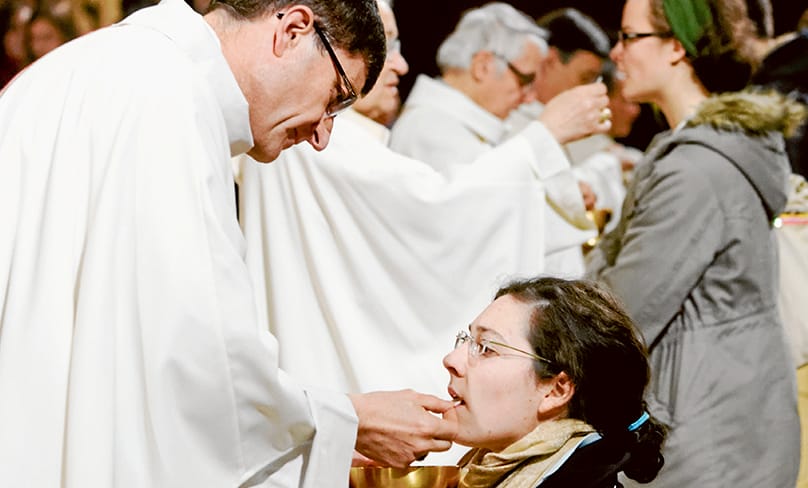
Are you eucharistically coherent? This is a personal question – but also a public one.
Eucharistic coherence is a way of saying that your soul, your conduct, and your beliefs all line up each time you receive Holy Communion.
But isn’t this a private thing that only I and God know about? Is this anyone else’s business?
It’s both. As Catholics, we live publicly and openly in a society of other Catholics and other people.
God expects our conduct “out there” to match our beliefs “in here”. The church also has a serious duty to teach you about this.
St Paul’s first letter to the Corinthians is mostly about how early Christians were failing to live up to their beliefs. They were acting like pagans with pagan friends, acting out sexually, fooling about in the liturgy, and giving bad example. Sound familiar?
St Paul reminds them: “So then, whoever eats the bread or drinks the cup of the Lord in an unworthy manner will be guilty of sinning against the body and blood of the Lord.
“Everyone ought to examine themselves before they eat of the bread and drink from the cup.
“For those who eat and drink without discerning the body of Christ eat and drink judgment on themselves” (1 Cor 27-30).
Nothing has changed. The church still teaches the same thing. So how can you tell if you’re eucharistically coherent?
Let’s start with your soul. Are you free from mortal sin? This ties some Catholics up in knots, especially if they are trapped in sexual compulsions and act on them frequently.
Here’s my rule of thumb. If it’s something that the church has always considered serious—like murder, or misusing sex—and if you know this, and you still did it anyway, it’s likely that you’ve committed a mortal sin.
Mortal sin totally separates you from God, so don’t take chances. Be sorry, go to confession, and then start making changes.
This might mean moving out of the house you share with your girlfriend or boyfriend. It might mean going into rehab or a 12-step program, or installing an internet blocker.

It might mean going to prison. It might even mean leaving your job, or your marriage. Do whatever it takes to get your soul at rights with God again.
Next, let’s look at your public conduct. Are you that TikTok star who advocates abortion on demand? Are you that employer who breaches contracts to under-pay your staff?
Are you that “devout Catholic” politician who never darkens a church door outside of an election campaign?
Does everyone at the local Catholic school know that you and your second wife got married in a civil ceremony?
You are all free individuals who are allowed to make free choices. But all those public and private choices have consequences in terms of receiving Holy Communion.
Think about the example you’re giving. Do your public and private lives line up with what Jesus has asked of us very clearly in the Gospels?
You might tell me to mind my own business, and that it’s a matter for your individual conscience. But your conscience can’t make something wrong into something right, just because you think the rules don’t apply to you.
Your conscience also can’t help you if you’ve fed it so many untruths over the years that it’s now dying of spiritual cirrhosis.
And what about your beliefs? Do you really believe that the Eucharist is the living body, blood, soul and divinity of Jesus Christ? Or do you have some vague ideas about it being symbolic and a special meal?
And if you really believe, then how do you act when you receive Holy Communion? Do you sleepwalk through Mass and shamble up and receive without a second thought, except about going home soon?
Do you really want to receive Jesus? Do you talk to him after you’ve received him into your body in an act that’s closer than sexual intercourse? An act that’s going to affect how you spend your eternity?
Holy Communion is not just a reward for good Catholics—although it partly is. Living in eucharistic coherence gives you a sneak preview of heaven on earth.
But no-one is entitled to receive Jesus whenever they want, or just because everyone else is. It’s like any other intimate relationship—you need to show love and respect.
There’s no shame in not going to Holy Communion sometimes. The real shame is treating God with a lack of respect and a sense of entitlement.
